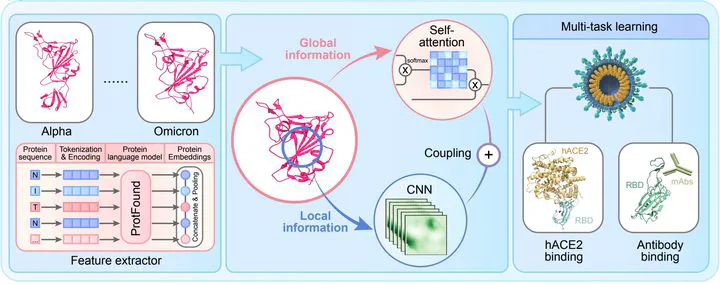Running Ahead of Evolution - AI based Simulation for Predicting Future High-risk SARS-CoV-2 Variants
Jun 20, 2023·
,
,
,
,
,
,
,
,
,
,
,
,
,
,
,
,
,
,
·
1 min read
Jie Chen
Zhiwei Nie
Yu Wang
Kai Wang
Fan Xu
Zhiheng Hu
Bin Zheng
Zhennan Wang
Guoli Song
Jingyi Zhang
Jie Fu
Xiansong Huang
Zhongqi Wang
Zhixiang Ren
Qiankun Wang
Daixi Li
Dongqing Wei
Chao Yang
Yonghong Tian

Abstract
The never-ending emergence of SARS-CoV-2 variations of concern (VOCs) has challenged the whole world for pandemic control. In order to develop effective drugs and vaccines, one needs to efficiently simulate SARS-CoV-2 spike receptor binding domain (RBD) mutations and identify high-risk variants. We pretrain a large protein language model with approximately 408 million protein sequences and construct a high-throughput screening for the prediction of binding affinity and antibody escape. As the first work on SARS-CoV-2 RBD mutation simulation, we successfully identify mutations in the RBD regions of 5 VOCs and can screen millions of potential variants in seconds. Our workflow scales to 4096 NPUs with 96.5% scalability and 493.9× speedup in mixed precision computing, while achieving a peak performance of 366.8 PFLOPS (reaching 34.9% theoretical peak) on Pengcheng Cloudbrain-II. Our method paves the way for simulating coronavirus evolution in order to prepare for a future pandemic that will inevitably take place. Our models are released at https://github.com/ZhiweiNiepku/SARS-CoV-2_mutation_simulation to facilitate future related work.
Publication
In International Journal of High Performance Computing Applications
The paper received the ACM Gordon Bell COVID Finalist 2022.